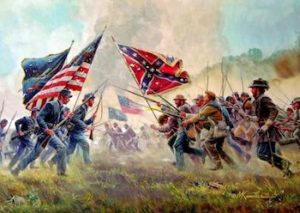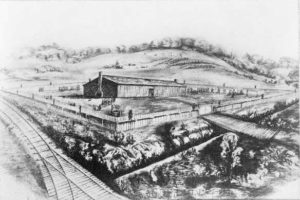Arguments Leading to the Civil War
By Joseph Parish
This brief document is intended to survey a few of the numerous elements which eventually contributed to the nation’s Civil War, along with an appraisal of the adverse feelings experienced by the southern states. The uncompromising blunt of the torment revolved around the Southern states, as these states underwent the prevailing events taking place during the nation’s growing pains. It is often quantified that it is wars which united a nation, and in America’s formable years this is exactly what had transpired. Granted, not all of the New World’s citizens were prepared to acknowledge the start-up nations independence from Great Brittan, however, in favor of these people, the populace did unit together as one with a healthy measure of protest against the objectionable behavior which the king was bestowing upon the colonies.
The country’s policies were evolving as a result of the revolutionary war, as well as enhancing the onset of the war of 1812. America was a nation in the process of sustaining a progression of extraordinary transformations, as the major argument persisted as to whether the course of the country should be agricultural, or engross the life of an industrial complex. As a nation, the people had corroborated countless enhancements involving the country by each succeeding president ultimately leading up to President Andrew Jackson.
It is found that with this unpopular president’s acceptance as potential leader of a nurtured nation, several new and unheard-of policies entered into the table for deliberation. The foremost issue of the time enmeshed the uncertainty of slavery. Granted, slaveries root originated long ago in the country’s history, however the time was approaching whereas the issue would come to a boil. There have always existed opponents who were wholly dedicated to the elimination of this barbaric act.
Jackson, during his presidency completely disregarded the people’s appeal to eradicate this ill behavior towards American black workers. Jackson himself, employed more than 140 slaves at his home and farm in Nashville, Tennessee. There can be no wonder that Jackson would desire to avoid any issues involving slavery in America. Jackson could very well ignore the problem if he so chooses, however the issue would simply not go away, and would in due course become a foremost factor in future elections.
With efforts underway to modernize the nation, Alexander Hamilton had leveled the playing fields for the new republic’s economic path. Lest one forgets, it was none other than Hamilton, who had fathered the government owned National Bank System. Since Hamilton was the in-facto leader of the Federalist Party, Alexander’s actions frequently placed personal ideas at odds with those of Jackson. It was Hamilton’s economic programs which fostered practices such as manipulation of the interest rates or the issuance of subsidies for various American companies. Both polices, it may be added, are still employed today. It is interesting to note that nowhere in America’s constitution is there a mention of a national bank. In order to overcome this oversight Hamilton employed a rather loose constructionist interpretation of America’s founding document in order to create the government bank. Hamilton contended that Congress had the established right to use whatever means at their disposal to implement its creation.
Hamilton envisioned a large federal bureaucracy with citizens dependent upon the Federal government, with the hopes that with dependence breeds loyalty. Hamilton’s staff exceeded 300 plus workers at the Philadelphia office, along with those who acted as tax collectors in various regional offices. Hamilton visualized the countries future as that of a manufacturing-based economy, and was a strong supporter of federal involvement within all aspects of the financial market. Hamilton was the first person to manipulate the stock market in efforts to contrast America with its European counterparts. The National Bank was created by a charter, which established a grant of $10 million dollars for its start-up. Critics stridently avowed that the bank served interests in the Northeast in opposition to representing the agrarian lifestyle.
After the war of 1812, America was gradually evolving as a nation and experiencing significant economic growth. In its wake, could be found various state banks, which were active with loaning money in such a speculative manner that it surpasses the bank’s immediate financial capacity. The federal government itself was busy creating huge debts by purchasing the territories of Louisiana, while all this time the government was still repaying its 1812 war debt. There were disastrous results taking place when the Second Bank insisted that the state banks recall their outstanding loans. Such actions resulted in widespread foreclosures, while some banks were forced into bankruptcy. The nation experienced elevated levels of unemployment. There was a drastic drop in the cotton prices, which eventually affected the growers, and on the whole, produced a widespread reduction of extra spendable money. Most of the people hit by this financial collapse held the Bank of the United States responsible.
President Jackson furthered his claim that the Second Bank of the US was unconstitutional, and that the bank posed a severe threat towards America’s economy, as well as to its political institutions. In reality, it is likely that with the suggestion that the bank supported manufacturing industry concerns more so than the agricultural interests, actually determined the veto for banks renewal.
The Indian Removal Act initiated by Jackson in 1830, exchanged the land of the Indians with large land owners setting the stage for the Indian’s ultimate removal to reservations west of the Mississippi River. Naturally, this proposal was greatly supported in the southern states as the people looked favorably into acquiring the Indian land. Again, we can see how President Jackson aligned himself with the individuals favored, in this case it was the southern farmer. Here is an interesting bit of trivia in that during the Congressional presentation of this bill, one of its opponents was none other than the famous Davey Crockett.
Moving on to the Indian relocation and the trail of tears as it was referred to, involved moving tens of thousands of Native Americans to a location which was unfamiliar to the tribe. All the tribes did not agree to this relocation and violence was forthcoming. As an example, with the Seminoles a violent time resulted as the Indians united with fugitive slaves. The two groups fought a losing battle with the stronger federal government, and it was only after numerous deaths took its toil that they were finally forced to relocate. This rebellion came to be known as the Second Seminole War, which lasted a long seven years before finally ending in 1842.
It is obvious that Jackson had a significant influence in America emerging into an organized national state. This was particularly renowned when the state of South Carolina resolved to nullify federal laws under the guise of violating the American Constitution. In his effort to prove the superiority of federal power over the state, Jackson quickly shuts down this state law with federal troops. As we find with any emerging nation, nothing is perfect and this was especially predominant with the young American nation as it experienced growing pains.
The United States never fully developed because it was distracted by circumstances. It can readily be seen that with approaching issues of industrialization, prevalent themes of racism and the vindictive actions of people in high positions, the nation had a complex time becoming a mature territory.
The demand for cotton and other American products pushed America to extremes in order to meet this incredible surge in goods. With this increase in demand, America also experienced a transportation and an economic boom to get the goods delivered. All over the New England cities could be seen the sprouting up of textile factories. For America, it was its time to witness rapid growth with its increased earning potentials. Of course, it must be realized that the north favored all this increased industrialization, while on the southern borders down south were content with their usual agricultural style as normal. When dealing with a period of time such as this in America’s historical chronicles, it is important to keep in mind that any policy which creates a hardship within one segment of the nation at the expense of another, endangers the union as a complete entity. Industrialization is an expected byproduct of any modern nation’s growth and prosperity.
On the subject of racism, it is known that the fugitive slaves believed that the north was the proverbial land of freedom, at least that was the impression received. The newly freed slaves quickly discovered differently upon arrival in the northern states, and although these migrants were no longer considered slaves the black arrivals were far from being free. The North fared no better for the displaced slaves than did the south, as neither region of the country was ready to treat the blacks as free beings. The discrimination and segregation experienced by the blacks were even rampant in the north. Disappointed in their treatment in the north, the African Americans quickly discovered that the black members of the community were excluded from churches, concert halls, public transportation and especially in schools.
Once again, let’s review some ironic trivia. After the American Revolutionary War, the blacks were granted the privilege to vote in many of the states, however, as the nation was continually growing it was discovered that many blacks were now losing those cherished rights in all the states. The only states which allowed a black man to vote were Maine, Massachusetts, New Hampshire and Vermont. This issue has become a major stumbling block which showed a strong capability to divide the nation. Blacks, Native Americans and woman were not permitted to vote.
Jackson had a very vindictive nature and although the history books may record Jackson as a charismatic figure, in all reality Jackson’s nature was combative and possessed with a quick ill tempered. Jackson displayed generosity and open considerations towards friends and allies, however enemies saw the man’s spiteful and mean-spirited side. Jackson was renowned for hatred towards opponents, which saw the full force of the gentleman’s vindictive and petty actions. Jackson was a man coherent of two faces. In one moment, the man would be out of control and raging like a mad bull, showing various fits of anger, while within another moment or two, Jackson would appear calm and collective. Jackson’s attitude towards slaves was drawn from the fact that the man was a large slave owner and thus opposed any reforms concerning slaves and their ownership. Based upon Jackson’s military background, it can be seen why he was completely anti-Indian. It is likely that the forced move of the eastern tribes to Oklahoma was likely the result of pent up anger from previous Indian wars.
One can quickly take stock on all the above issues revolving around the new nation and if the writing on the wall is properly read, it is clear that before long this new nation will be experiencing a Civil War of great magnitude. As a young nation feeling its oats, America has many burdens to move prior to being considered a mature and composed country. The Civil War was a black mark upon the nation. More people died as a result of this conflict than all the other wars our country has been in. It was a war of ideas between the federal government and the states. One can see the federal government boldly thinking it has the last word over the states’ desires, while the southern states feel rejected and shoved into a corner. It wasn’t a war fought for human freedom and dignity as our childhood history class often revealed, but rather a war of power. Jackson had initially begun a series of ventures which would eventually benefit our new country, but he also hurt it for a number of years to come.
For more interesting articles why not visit me at: wordwriter.info



